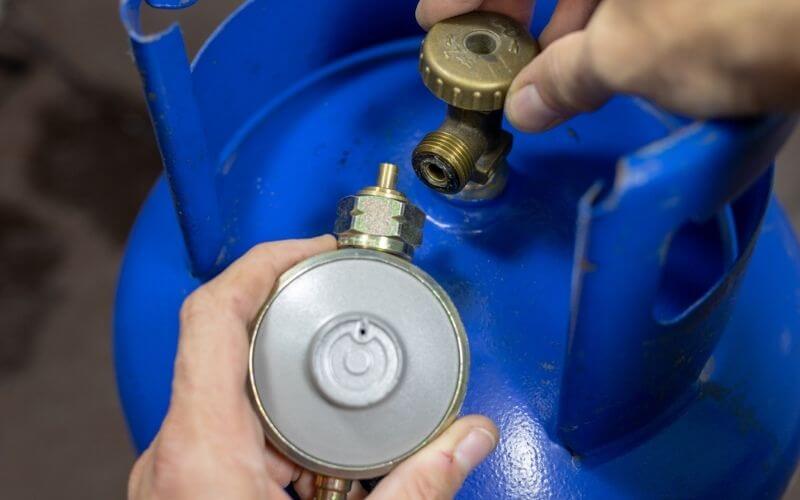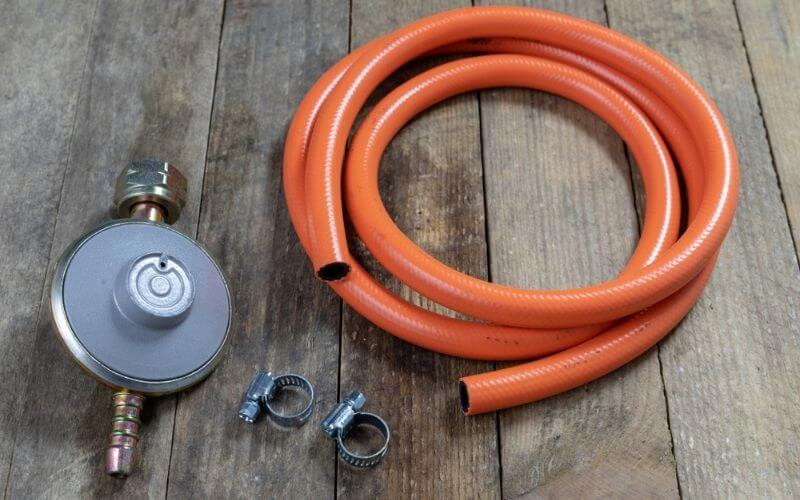how to tell what magma grill you have
So information technology's been a while since you've checked up on the propane system of your grill. Propane or gas grills are a blessing as they require niggling maintenance and are pretty easy to use. This ways that propane tank regulator bug tin creep upwardly on yous and take you by surprise.
A faulty propane stove regulator or gas fireplace regulator or whatever other appliance tin can spell disaster when left unchecked. This besides applies to grills, your house propane regulator, and even forklift propane regulator troubleshooting.
Not sure how to tell if propane regulator is bad? If you've been side-eyeing your propane regulator because something seems (but you tin't figure out what), this article will save y'all lots of guesswork.
We've compiled x symptoms of a bad propane regulator and so that you tin arrange a replacement in advance.
You may as well like: How do you unstick a propane tank valve
10 Signs That Your Propane Regulator Needs Replacing

If you think your propane regulator is interim up, check your system for the following signs. These faulty gas regulator symptoms will let yous know that it's fourth dimension to become a new ane.
01. Yellow Flames:
Any kind of appliance that is fueled by propane should take stiff blueish flames, which is an indication that it is working every bit information technology should. If you light your stove or plough on your grill and see lazy yellow flames instead of blueish, it is a sign that your regulator needs replacing.
This is also a sign that the gas grill regulator pressure is low. A propane pressure regulator that is working will create blueish flames that are level with the burner. On the other hand, if the flames are blue, noisy, and very tall information technology means that the LP gas regulator has high pressure.
Either way, the flames are the biggest indicator that natural gas regulator problems are on the rise. As a consequence, information technology may exist time for an RV propane regulator troubleshooting.
02. Sooty Residue:
Deposits of soot on your burner are another common symptom that your propane gas regulator needs fixing or changing. When propane burns, it burns with a rather clean flame and doesn't give off night fume.
If you notice dark spots and blackened residue effectually your heater, stove, or fireplace, something is wrong with your burner which is preventing the fire from burning cleanly. If adjusting the heat doesn't help, it may be time to change your propane tank, pressure regulator.
03. Popping Sounds:
As mentioned above, propane burns cleanly and quietly. Do you hear popping noises when you turn off your burners? If yes, it is a sign that y'all need to change either the burners or the gas valve regulator. Once the changes are made, the popping noises will get away.
04. No Propane Flow:
Of course, if there is no propane flowing through the system, your burners volition not lite up. This can happen because the propane grill regulator pressure is extremely low. Or it can exist caused by the prophylactic feature within the regulator.
When the regulator detects a high propane menses it engages the condom valve and shuts off the same feature that is found on propane tanks. The propane regulator can exist reset by switching off the propane tanks and ensuring all the propane appliances are shut off.
05. Faulty Vents and Leaking:
If you can aroma propane when using your appliances, it is a articulate sign that the regulator is leaking. If y'all want to confirm any leaks, spray or pour some soapy dishwater over the regulator. If bubbling start forming, that'southward the location of your leak.
Also, there are vents situated at the lesser of the regulator. These help the regulator breathe and prevent information technology from overheating.
Information technology besides acts as a condom feature that prevents the pressure from getting too high when the tank is overfilled. If yous check and observe that your tank isn't overfilled, it may exist time to switch to a unlike regulator.
06. Automatic Changeover is Malfunctioning:
This is meant for appliances with dual propane tanks and an automatic RV propane regulator. A new regulator volition allow the appliance to switch to the second tank automatically, so you don't have to do anything.
The tank level indicator might start showing red and won't reset. Together with weak and yellowish flames, it is an indication that something is seriously wrong with your regulator. If your automated system is malfunctioning out of the blue, information technology may be an early on sign that your regulator is going bad.
07. It's Been Frozen:
This can happen in very cold climates, and if yous haven't been maintaining your appliances over the winter. If you find a buildup of frost around the regulator for your fireplace or water heater, there's a skilful chance that it will need replacing.
Propane tank regulator freezing is fairly common and isn't difficult to set. The trouble lies within the condensation that happens when the frost melts. The h2o can damage the regulator and effect in serious malfunctioning.
08. It's Been Dunked in Water:
If your propane tank regulator has been submerged in water, it will have to be replaced equally soon as possible. The water enables chemicals and debris to go into the regulator jump expanse, which so leads to corrosion, rusting, and failure.
Drying it off isn't a solution either. Although information technology may seem undamaged at first, the appliance will diffuse the gas unevenly through the system and lower its overall efficiency. This will upshot in a depression-pressure propane regulator which is more trouble than what it's worth.
09. Information technology Smells of Propane:
If yous can odour the natural gas when using your grill or stove, the safety arrangement in your regulator may be busted. Gas leaks tend to happen in the diaphragm, a flexible disc that regulates the gas flow to an appropriate flow rate.
It works together with the regulator vent, which moves the diaphragm upwards and downwards. If the vent isn't leaking, information technology may be that the diaphragm is broken, then you need a new regulator anyways.
10. Your Regulator is over a Decade Old:
Propane regulators aren't designed to work forever without hiccups. They have a shelf life of around 10 years, which means that later this time frame, you will notice pregnant malfunctions. There may be cypher wrong with it, just that it needs to retire ASAP.
If you've been using the same old propane regulator for the by 12 years, getting a new ane should exist a priority.
Y'all may also like: How to repair pellet stove auger motor
Finding Your Propane Regulator

Regulators are generally establish under the tank dome or when installed exterior the dome, they will accept the vent pointed downwardly. The vent is pointed this way to prevent pelting, ice, and dust from inbound the regulator.
In short, the regulator volition always be found somewhere near the tank.
The vent more often than not has a screen that keeps insects out, equally certain insects will make a nest in a regulator without a protective vent screen. Regulators also have internal moving parts that are subject to wear and tear and afterwards some time, resulting in their frequent alteration.
Propane companies tin can tell customers when the regulator needs to be changed due to either age or malfunction and the consumer needs to replace the regulator rapidly.
The industry norm is ten years earlier a regulator needs replacement, although some may have to be replaced even sooner.
If your regulator has ever been underwater, it needs to be thrown out immediately. There is a departure between adjusting the gas valve regulator and replacing it. While licensed mechanics can brand adjustments, a malfunctioning propane regulator has to be replaced.
Still Have Questions?
Below yous will find answers to queries people tend to have well-nigh replacing their propane regulators.
01. How Does a Propane Regulator Work?
In most cases, propane regulators produce a working gas force per unit area in the area of less than a pound of pressure level that can be measured on a estimate.
This is done by a rubber diaphragm that is attached to the inside of the aluminum saucer. The pressure spring moves against this diaphragm and helps to control the dispersed gas.
02. What Does a Propane Regulator Do?
The purpose of a propane regulator is to control the menstruation of gas vapor from the tank to the burner tip. The regulator ensures rubber past delivering over-pressure level protection, usually past using a pressure relief device. This prevents leaks and loftier force per unit area, which can lead to fires and explosions.
03. What Kind of Propane Regulator Exercise I Demand?
This depends on the kind of apparatus you need the regulator for. For instance, you will need a different regulator for grills, fireplaces, stoves, and water heaters. Also, the kind of regulator will depend on the number of BTU/hr.
04. What Does Propane Look Like?
Propane is a colorless gas with a light but distinct odor. Most commercial propane is stored under pressure in tanks, in liquid course. Liquid propane looks like water; it is colorless and odorless.
Epilogue
Regulators are an of import part of any propane-fueled system. A working regulator volition allow yous to use your appliances safely and properly. Knowing how to tell if propane regulator is bad will assist become a replacement before it is as well tardily.
As a upshot, information technology is important to go on a lookout for the dissimilar symptoms that point malfunction. With all that being said, have you noticed whatever of these signs on your propane regulator?
Source: https://boatbasincafe.com/how-to-tell-if-propane-regulator-is-bad/
0 Response to "how to tell what magma grill you have"
Post a Comment